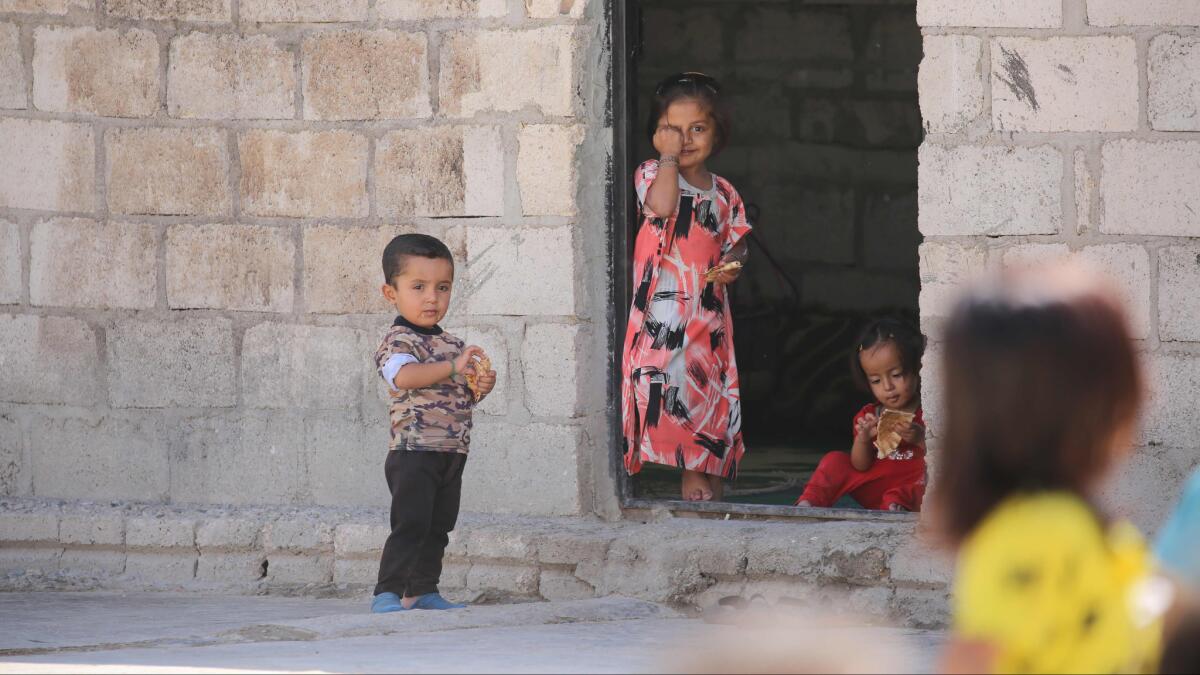The Syria cease-fire, the rebels and the government of President Bashar Assad

Reporting from Istanbul, Turkey — The cease-fire in Syria could change the country if it finally leads the government to halt mass killing of its citizens, starvation sieges and the continuing destruction of the civilian infrastructure, observers say.
But few in the opposition expect that outcome. Rebel commanders view the accord announced last week by the United States and Russia as propping up President Bashar Assad at a time his conscript army has practically lost its will to fight and he depends on the military intervention of Russia, Iran, and their allies for his own survival.
Assad’s opponents, an all-volunteer force, say they have little choice but to support any step that will ease the suffering of their families and all civilians.
“We will comply, but we have lost confidence in the international community,” Col. Ahmad Sa’ud, Commander of Division 13, based in Idlib province, said in an interview via Skype. During the last truce, the government dropped barrel bombs on civilians in Ma’arat al Numan as they went to markets, killing 60 and wounding 100. “We worry that this is another ambush of the Syrian people.”
These commanders are convinced Assad could be forced to the negotiating table if the U.S. reversed its refusal to provide them with anti-aircraft weaponry.
“The regime has air superiority over us,” said Sa’ud. “If it were not for the air force, the regime couldn’t hold one square meter of land.”
Four days into the cease-fire, violations are on the rise. At least six civilians died in government airstrikes in Idlib, Aleppo and Hama provinces Friday, local authorities said. Rebel forces said they killed 20 soldiers and destroyed a tank in repulsing government forces and foreign Shiite militias which stormed the Jobar neighborhood, for a loss of three opposition commanders.
Russia and Syria claim rebel fighters have caused dozens of cease-fire violations in the first four days with machine gun or mortar attacks on military and civilian targets. But the Syrian Network for Human Rights, a humanitarian watchdog often cited by the U.S. State Department, said Friday that there were 28 violations in the first 48 hours, all by government forces or their allies.
And although U.S. Secretary of State John F. Kerry and Russian Foreign Minister Sergei Lavrov set a high priority for delivery of relief to besieged Aleppo, where there are 300,000 people, and over a million in other surrounded towns and cities, no aid has arrived anywhere since the cease-fire began Monday night.
The most biting criticism of the accord by opposition fighters is that it gives Russia, Assad’s main backer, equal weight to the United States in determining violations. “Russia is a member of the oversight committee, but it also takes part in the bombing,” Ahmad Qara Ali, the spokesman for Ahrar al Sham, an Islamist fighting group, said via Skype. Added to that, there are no sanctions for violations.
The accords are still secret, and it’s not known if they will require all participants to guarantee the protection of civilians — a central principle of international law.
Also rankling with the opposition is that if the cease-fire holds, the U.S. and Russia will set up a joint center to cooperate in targeting Fateh al Sham, formerly known as Jabhat al Nusra, which for three years was the Al Qaeda affiliate in Syria. In Idlib province, which is totally under rebel control, and to a much lesser extent in Aleppo, al Sham fighters operate in close proximity of U.S.-backed rebel forces.
Al Sham fighters “are among us, that is true,” Dawood Mahmud, a commander of rebel forces in east Aleppo, said in a statement. “They are here because no one else is. They have kept our city open and have reopened it when it was besieged. Where was Russia and the U.S. then? I’ll tell you where. The U.S. was nowhere and Russia was bombing us. And now they say ‘trust us.’”
“We oppose targeting any group that is fighting the regime,” said Qari Ali. “That will weaken the military power of the revolution and strengthen the regime.”
Yet many close observers acknowledge that the cease-fire may be the best deal the U.S. could get in light of President Obama’s policy of not challenging the Russia or Iranian interventions and not providing the opposition with the means to stop the government’s air attacks on civilian targets.
Assad for his part seized on the cease-fire to renew his vow to re-conquer the entire country.
“We have come here to give the message that the Syrian nation is determined to retake every piece of land from the terrorist,” he said Monday, speaking in Daraya, the town that surrendered late last month after the government captured its farmlands and destroyed its crops.
But it’s not clear how laying siege to cities and dropping barrel bombs from high flying helicopters will accomplish that goal.
A Russian analyst in a report that got wide circulation within U.S. government circles, last week said Assad’s military cannot win and it’s “time” for Russian forces “to go home.”
Soldiers have no benefits, the food is poor and the morale low, wrote Mikhail Khodarenok, a retired Russian Air Force officer, in the Russian publication Gazeta. The general staff has no coherent short or mid-term strategic plans, and blames the “high combat capabilities” of the opposition, a lack of ammunition and fear of heavy losses in fighting.
“It’s unclear what should be done to the half-rotten structure of the Syrian army” he said.“On the one hand it would seem easy to completely demobilize (in other words, completely disband) the Syrian army and recruit a new one…On the other hand, the main problem is that new men are nowhere to be found in modern Syria.”
He said the war is being fought by foreign militias while more than half the Syrian army man fortified checkpoints and exact bribes from those trying to move past them. He said the “morale and combat capabilities of the [opposition] militants are far above those” of the Syrian army.
The commander of the U.S.-backed Izza Army in Hama said 75% of the Syrian army man checkpoints and are responsible for guarding government-held areas. The rest are in military barracks or guarding weapons depots, said Maj. Jamil al Salih. In rebel-intercepted radio communications, he said, Syrian officers would complain that the Russians “are pushing us to our death, they are deaf to our suffering.”
Meanwhile, the Pentagon has deployed about 40 special operations forces to assist Turkish ground troops as they plan an offensive against Islamic State militants in Dabiq, on Syria’s northern border, according to U.S. officials who weren’t allowed to speak publicly on the matter.
Gen. Joseph F. Dunford Jr., chairman of the Joint Chiefs of Staff, huddled Friday with a senior Turkish military official, Gen. Hulusi Akar, at a meeting of NATO generals in Split, Croatia. The two discussed “the way forward in the fight against” Islamic State, Capt. Greg Hicks, a military spokesman, told reporters.
Officials said Turkish forces plan to sweep along the Syrian border east to Dabiq, pushing Islamic State fighters from defensive positions along the way.
Last month, Turkish forces and U.S.-backed Syrian rebels defeated the militants in Jarabulus, a border town that had served as a critical way station for Islamic State to move weapons and fighters from Turkey.
Gutman is a special correspondent. Times staff writer W.J. Hennigan in Split, Croatia, contributed to this report.
More to Read
Sign up for Essential California
The most important California stories and recommendations in your inbox every morning.
You may occasionally receive promotional content from the Los Angeles Times.










